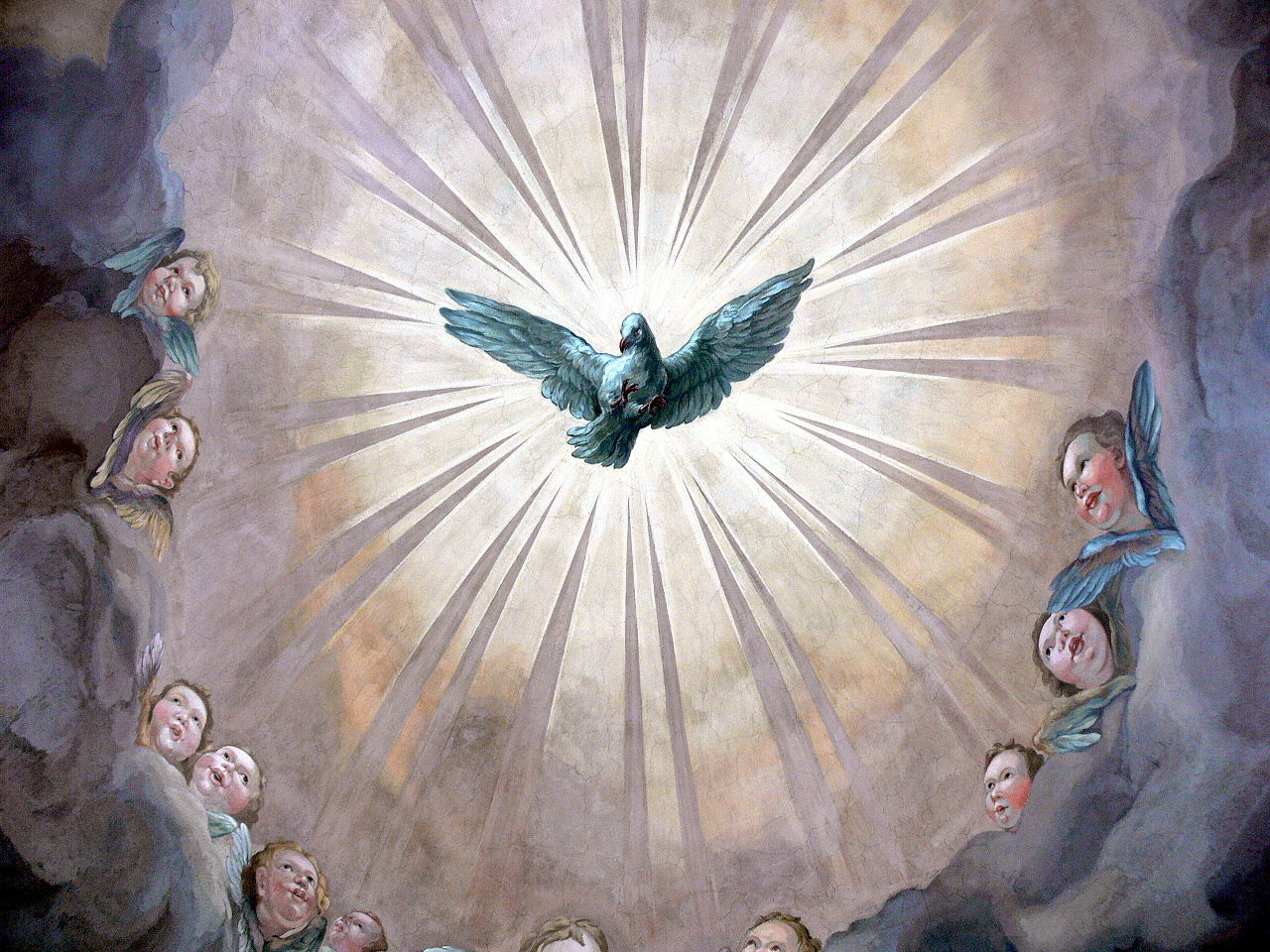
Fresco at the Karlskirche in Vienna (by Johann Michael Rottmayr)
Homily for Pentecost Sunday,
the Vigil Mass, 8 June 2019
Come, Holy Spirit, fill the hearts of your faithful,
and kindle in them the fire of your love.
Send forth your spirit, and they shall be created,
and you shall renew the face of the earth.
The first two lines are the verses
that were sung with the Alleluia before the Gospel. The third and fourth lines
are from Psalm 104, verse 30. This is a prayer that is usually recited before
reading Holy Scripture.
Pentecost is the Church’s great feast
of the Holy Spirit. The name comes from the Greek and means fiftieth, and
signifies the number of days after Passover when the Jews celebrated Succoth,
the festival of first fruits, similar to our Thanksgiving. Today’s Gospel
reading takes place around this time of Succoth. Our passage ends with the curious
line, “There was, of course, no Spirit yet, because Jesus had not yet been
glorified.”
What does this mean? In the Old
Testament, the word for “spirit” is the Hebrew word ruah.
The word is sometimes translated as “wind” or “breath” as in Genesis 1:2: “a wind from God swept over the face
of the waters” and Genesis 2:7: “then the Lord God formed man from the dust of
the ground, and breathed into his nostrils the breath
of life.” In both cases, God’s ruah, God’s
spirit, is a creative, dynamic force. And in both cases, God’s ruah is interacting with the world
and ultimately, with people. (Ekeh). In the time of
Christ, the Holy Spirit comes to dwell with the person, even while the mind and
heart and actions continue to be one’s own.
The result of this kind of giving of the Spirit is not a superhuman
strength. The result is the fruits of the Holy Spirit: love, joy, peace,
patience, and more.
So this is what the Gospel means.
Before Christ, the Holy Spirit animates all creation. But in the outpouring of
the Spirit at Pentecost, the Holy Spirit was given to Christ’s people, to dwell
with them always, in loving peaceful union with Christ, available to anyone who
will come to Christ to drink. (Stump)
So how and where do we find the Holy
Spirit in our life? The Spirit is not something to be pinned down. The very
nature of the Spirit is to be on the move, but in an unexpected moment, if we
are attentive we will be aware of the Spirit. The Holy Spirit is the love of
God—unbridled, unbound, totally free, entirely present—creating, revealing,
enlivening, breathing—among us, through us, and within us. This is what the
Scriptures tell us. This is what our hearts know. (Ekeh)
How can we be attentive to the
spirit? Theologian Dietriech Bonhoffer wrote, “We are so afraid of silence that
we chase ourselves from one event to the next in order not to have to spend a
moment alone with ourselves, in order not to have to look at ourselves in the
mirror.” Our day to day lives are filled with all kinds of distractions.
Sometimes we deliberately keep ourselves so preoccupied that we never give the
Spirit a moment’s notice.
Father Thomas Keating, a Trappist
monk, based a technique called Centering Prayer on the words of Jesus, “When you pray, go to your inner room, close the door, and pray to
your Father in secret”(Mt 7:6). Jesus by his own example would go off by
himself to pray. Keating writes,” The grace
of Pentecost affirms that the risen Jesus is among us as the glorified Christ.
Christ lives in each of us as the Enlightened One, present everywhere and at
all times. He is the living Master who continuously sends the Holy Spirit to
dwell within us and to bear witness to his resurrection by empowering us to
experience and manifest the fruits of the Spirit and the Beatitudes both in prayer
and action.”
With centering prayer a person sets aside a
time and place every day for quieting the body and mind so the “voice of the
Spirit” can be heard. No technique or practice can bring the Holy Spirit on
demand, and the presence of the Spirit may not even be sensed during the period
of centering prayer. It may, in fact, be sensed at another moment when
circumstances come together. The point is, if we never open ourselves to the
Spirit, we will be depriving ourselves of all the Spirit’s wonderful
fruits: charity, joy, peace, patience,
kindness, goodness, generosity, gentleness, faithfulness, modesty,
self-control, and chastity.
In this celebration of the Eucharist
today let us ask Christ to fill us with “rivers of living water” so that we may
experience the Holy Spirit working in our life.
Come, Holy Spirit, fill the hearts of your faithful,
and kindle in them the fire of your love.
Send forth your spirit, and they shall be created,
and you shall renew the face of the earth.
No comments:
Post a Comment